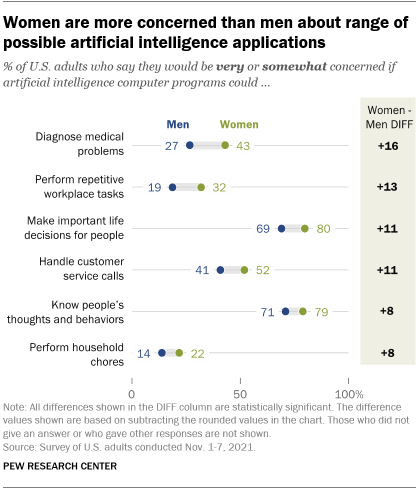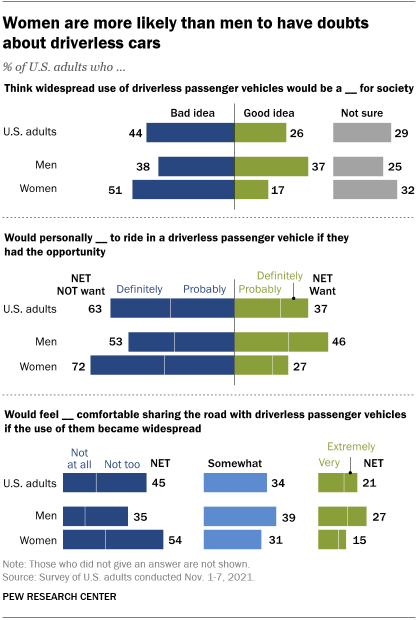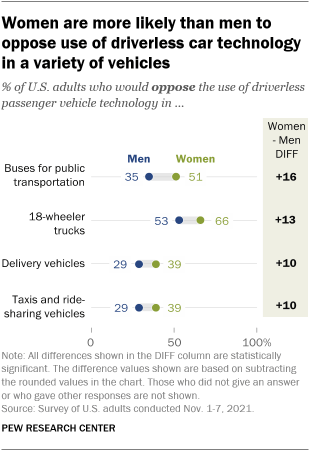Women in the United States are more skeptical than men about some uses of artificial intelligence (AI), particularly the possible widespread use of driverless passenger vehicles, according to a new analysis of Pew Research Center survey data collected in November 2021.
The analysis also finds gender differences in views about the overall impact that technology has on society and some safety issues tied to AI applications, as well as the importance of including different groups in the AI design process.
Pew Research Center conducted this study to understand gender differences in Americans’ views about artificial intelligence and human enhancement technologies. For this analysis, we surveyed 10,260 U.S. adults from Nov. 1-7, 2021.
Everyone who took part in the survey is a member of the Center’s American Trends Panel (ATP), an online survey panel that is recruited through national, random sampling of residential addresses. This way, nearly all U.S. adults have a chance of selection. The survey is weighted to be representative of the U.S. adult population by gender, race, ethnicity, partisan affiliation, education and other categories. Read more about the ATP’s methodology.
Here are the questions used for this analysis, along with responses, and its methodology.
Overall, women in the U.S. are less likely than men to say that technology has had a mostly positive effect on society (42% vs. 54%) and more likely to say technology has had equally positive and negative impacts (45% vs. 37%). In addition, women are less likely than men to say they feel more excited than concerned about the increased use of AI computer programs in daily life (13% vs. 22%). Gender remains a factor in views about AI and technology’s impact when accounting for other variables, such as respondents’ political partisanship, education and race and ethnicity.

Moreover, across a range of possible AI applications that the November survey asked about, women are consistently more likely than men to express concern about computer programs executing those tasks. For example, 43% of women say they would be very or somewhat concerned if AI programs could diagnose medical problems, while 27% of men say the same. Gender gaps also appear in the amount of concern Americans express about AI programs being able to perform repetitive workplace tasks, make important life decisions for people and know people’s thoughts and behaviors.
Women feel more negatively than men about driverless passenger vehicles
In addition to gender differences about AI in general, women and men express different attitudes about autonomous cars, specifically.

Men are more likely than women to respond positively to several questions about these vehicles. Roughly four-in-ten men (37%) say driverless cars are a good idea for society, while 17% of women say the same. Women, in turn, are somewhat more likely than men to say they are not sure if the widespread use of driverless vehicles is a good or bad idea (32% vs. 25%).
On a similar note, 46% of men say they would definitely or probably personally want to ride in a driverless passenger vehicle if given the opportunity, compared with 27% of women. Most women (72%) report they would definitely or probably not want to do this. Relatedly, a majority of women (54%) say they would not feel comfortable sharing the road with a driverless passenger vehicle if their use becomes widespread. Only 35% of men say the same.
These differences may be associated with women’s greater doubts about the safety of autonomous vehicles. When asked about the effect that the widespread use of these cars would have on the number of people killed or injured in traffic accidents, about half of men (49%) say it would decrease the number of people killed or injured, compared with three-in-ten women who say the same. By a 33% to 20% margin, women are more likely than men to think the number of accidents would increase.

Women’s concerns about the safety of autonomous passenger vehicles extend to other applications of driverless systems, too: 51% of women say they oppose the use of this technology in public transportation buses, compared with 35% of men. Women are also about 10 percentage points more likely to oppose the use of driverless vehicle technology in 18-wheeler trucks, delivery vehicles, and taxis and ride-sharing vehicles.
Although these figures cannot be directly compared to previous surveys because of changes in question wording, the current findings align with a 2017 Center study, which found that women are less likely than men to say they would want to ride in a driverless vehicle. Previous Center research has also indicated that women are at times more pessimistic than men about technological change more broadly.
Women and men differ over other applications of artificial intelligence
Besides exploring public views about the possible use of driverless passenger vehicles, the Center’s November survey also covered two other specific AI applications: the use of face recognition technology by police and the use of algorithms by social media companies to find false information on their sites.
There are differences between women and men on some questions related to these applications. Although a majority of both men and women have heard of each AI use, one clear pattern is that men are more likely than women to say they have heard or read at least a little about each of the three technologies: driverless cars (93% vs. 83%), face recognition use by police (86% vs. 74%) and social media algorithms to find false information (81% vs. 70%).
Women are also more likely than men to say they are not sure whether particular AI applications are a good or bad idea for society. Some 34% of women are unsure about whether social media algorithms to find false information are a good or bad idea, compared with 26% of men. When it comes to the use of face recognition by police, 31% of women are not certain whether it is a good or bad idea, compared with 22% of men.
Gender differences on the design of AI technologies
Women are more likely to support the inclusion of a wider variety of groups in AI design. For example, two-thirds of women (67%) say it’s extremely or very important for social media companies to include people of different genders when designing social media algorithms to find false information, compared with 58% of men. Women are also more likely to say it is important that different racial and ethnic groups are included in the same AI design process (71% vs. 63%).
Additionally, women are more doubtful than men that it is possible to design AI computer programs that can consistently make fair decisions in complex situations. Only around two-in-ten women (22%) think it is possible to design AI programs that can consistently make fair decisions, while a larger share of men (38%) say the same. A plurality of women (46%) say they are not sure whether this is possible, compared with 35% of men.
"some" - Google News
August 04, 2022 at 02:07AM
https://ift.tt/6oSylNi
U.S. women more concerned than men about some AI developments, especially driverless cars - Pew Research Center
"some" - Google News
https://ift.tt/oD8qArH
Shoes Man Tutorial
Pos News Update
Meme Update
Korean Entertainment News
Japan News Update
Bagikan Berita Ini














0 Response to "U.S. women more concerned than men about some AI developments, especially driverless cars - Pew Research Center"
Post a Comment